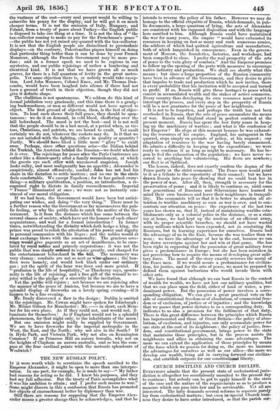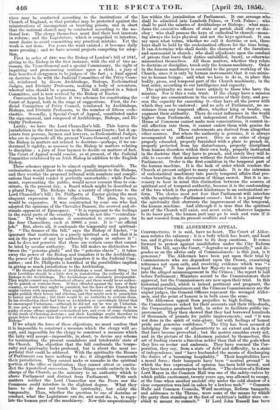CHURCH DISCIPLINE AND CHURCH DECLINE.
EVERYBODY admits that the 'present state of ecclesiastical juris- diction is altogether too scandalously unsuited to the present day to continue ; but nobody can be got to 'apply himself to the state of the case and the nature of the requirements so as to produce a measure which can pass into law and be serviceable. Yet all are interested. The laity demands several reforms to separate purely lay from ecclesiastical matters ; but even in special Church busi- ness they desire to have order introduced, so that the parish ser-
vices may be conducted according to the institutions of the Church of England, so that parishes may be protected against the ministrations of incompetent or brawling priests, and in short that the national church may be conducted according to the na- tional law. The clergy themselves must find their best interests in reform ; and the Legislature, which is compelled to interfere, must desire to avoid committing any practical mistake. Yet the work is not done. For years the want existed ; it becomes daily more pressing; and we have several projects competing for adop- tion.
First in order of date was the Bishop of London's bill of 1847, giving to the Bishop in the first instance, with the aid of two as- sessors, the Vicar-General and a special bommissary, the right of inquiring and pronouncing sentence upon a clerk • a jury of four beneficed clergymen to be judges of the fact.; a final appeal on doctrine to lie with the. Judicial Committee of the Privy Coun- oil, reinforced by divers Archbishops, Bishops, Ecclesiastical Judges, and Divinity Professors, making a body of seventeen, whereof nine should. be a quorum. This bill expired in a Select Committee, and is now revived by the Bishop of Exeter. Convocation has had before it two schemes for constituting the Court of Appeal, both in the stage of suggestions. First, the Ju- dicial Committee of Privy Council, reinforced by Archbishops, Bishops, and Divinity Professors, to the number of fifteen ec&- simile% Secondly, a Special Court of Apial, constituted under the sign-manual, and composed of Archbishops, Bishops, and Di- vinity Professors. Lastly, we have the Lord Chancellor's bill. This leaves the jurisdiction in the first instance to the Diocesan Courts ; but it ap- points four persons, laymen and lawyers, as Ecclesiastical Judges, who are to supersede all the present Vicars-General, and to act for the Bishop in matters not related to doctrine—perhaps, if we un- derstand it rightly, as assessor to the Bishop in matters relating. to discipline ; a jury of four laymen to decide on matters of fact. The Court of Appeal would consist, as at present, of the Judicial Committee reinforced by an Irish Bishop in addition to the English Bishop. These schemes appear to be almost equally impracticable. The ecclesiastics would draw the complete jurisdiction to the Bishops, and they overlay the proposed tribunal with numbers and compli- cations that would render it perfectly unworkable ; while-Parlia- ment, representing the public, would never consent thus to con- stitute, in the present day, a Board which might be described as
a plural Pope. The Bishops take a variety of objections to the Lord Chancellor's bill ; Dr. Phillpotts of Exeter giving the most,
eloquent expression to those objections. The plan, he says, would be expensive. It was constructed by some one who had adopted the opinions of the Chevalier Bunsen, the avowed and ob- stinate opponent of Episcopacy. " It is repugnant to the feelings in the rural parts of the country," which do not like " centraliza- tion." The whole scheme is constructed to create posts for the four Chancellors, each at 30001. a year. It is " an official job:" But, above all, it confounds the temporalty and spiritual-
g{/ The framer of the bill," says the Bishop of Exeter, "is: ignorant that institution is a purely spiritual act, and that it m not in the power of any lay authority to enjoin or enforce it " ; and he does not perceive that there are certain cases that cannot
be tried by secular authority. The bill makes no distinction be- tween the " potestas gladii " and the " potestaa clavis " ; it takes away the power of the Bishop and transfers it to the Archbishop, the power of the Archbishop and transfers it to the Judicial Com- mittee ; and Dr. Phillpotts is horrified at the possibilities Implied in giving so much jurisdiction to the Archbishop.
" He thought the institution of Archbishops a most blessed thing ; but their Lordships should be a little slow in transferring the authority of the. Bishops to the Archbishops. The Archbishops are absolutely irresponsible. They might commit any ecclesiastical offence, and there would be no author- ity to punish or restrain them. If they offended against the laws of their country, no doubt they might be punished, but the laws of the Church they might violate with impunity. They might be heretics and atheists, they might.publish their heresy and atheism, and they might seek to proselytize to heresy and atheism ; but there would be no authority to restrain them. In-his recollection there had been an Archbishop so exceedingly liberal that he encouraged Unitarians,—although he did not say he was an Unitarian. It was not a mere idle fancy that it is possible for an Archbishop to be guilty of some offence against ecclesiastical law, and even of some violation of the truth of Christian doctrine ; and their Lordships ought therefore to pause before they gave him the power of encroaching on the authority of the Bishops." If we admit the force of these objections, we must confess that itis impossible to construct a measure which the clergy will ac- cept, and impossible for the clergy to construct a measure-which the laity will accept—impossible, in short; to devise any scheme for terminating the present scandalous and intolerable state of the Church. The objection that the bill confounds the'tempo- ralty and spiritualty looks profound, but is about the most su- perficial that could be adduced. With-the spiritualty the Houses of Parliament can have nothing to do ; it altogether transcends their jurisdiction. They cannot make or unmake in the spiritual • portion of the office or institution ; they. cannot attest or contra- dict the Apostolical succession. These things reside entirely in the charge of the -Church, as the ministry to an authority which is- above Parliament and distinct from Parliament With such matters neither the Lord Chancellor nor the Peers nor the Commons could interfere in the slightest degree. What they have to do does not touch the spiritualty, but- solely the temporalty. Thus, whether the question be one of doctrine or conduct, what the Legislature can do, and must do, is, to re - late the human part •of the machinery. Now this unquestionably
lies within the jurisdiction of Parliament. It can arrange who shall be admitted into Lambeth Palace, or York Palace ; who shall be paid the salaries of Archbishops or Bishops ; what man- dates the executive officers of state or parish shall obey or dis- obey ; who shall possess the keys of cathedral br church.—mean- ing always the keys physical and not the keys spiritual. It can say upon what terms, whether we call it doctrine or not, those keys shall be held by the ecclesiastical officers for the time being. It can determine who shall decide the character of the furniture and-ceremonial in church ; who shall ad' udicate upon the conduct of priests that leave their duties unfulf ed, brawl, or otherwise misconduct themselves. All these matters, whether they relate to doctrine or discipline, touch only the human machinery. Order in the human machinery is essential to the proper working of the Church, since it is only by human instruments that it can-minis- ter to human beings ; and what we have to do is, to place this bodily, gross, and temporal part of the Church machinery, in the best ord.er, according to our intelligence and capacity.
The spiritualty we must leave entirely to those who have the mission. Nor is this a vain trust. If the clergy have a mission —if they are conscientious in the exercise of their duty, and pos- sess the capacity for executing it—they have all the power with which they can be endowed; and no acts of Parliament, no as- sistance from any temporal officer, whether king or beadle, can augment their authority. There do exist infinenc.es in the world higher than Parliament, and independent of Parliament. The House of Commons cannot make men conscientious, it cannot in- stil affection into them, it cannot endow them with genius for literature or art. These endowments are derived from altogether other sources. But where the, authority is genuine, it is always accompanied by sufficient power. Give us an order of clergy properly educated, properly furnished with a place to preach in, properly protected from lay disturbances, properly disciplined from human disorders within their own body, properly instructed in the doctrine .that they have to preaeh, and surely they will.be able to execute their mission without the further intervention of Parliament. Order is the first-condition in the temporal part of the human machine. It is the lack of order which tenders . the Church at •present subject to many scandals. It is the intrusion of ecclesiastical machinery into purely temporal affairs that pro- vokes brawling in the discussion of things sacred. But it is ne- cessary to bear in mind this distinction between the sources of spiritual and of temporal authority, because it is the confounding of the two which is the greatest hinderance to an eeclesiasticalre- form. The clerics need not fear that Parliament will interfere with the spiritualty—Parliament cannot ; but it is a jealousy for the spiritualty that obstructs the improvement of the temporal, the human.machine. And although-it is true that the . spirituaL part of the Church will exist, and.must exist, whatever happens to its baser part; the human part may go. to rack and ruin, if it be not rescued from its present _conflicts and scandals.



























 Previous page
Previous page